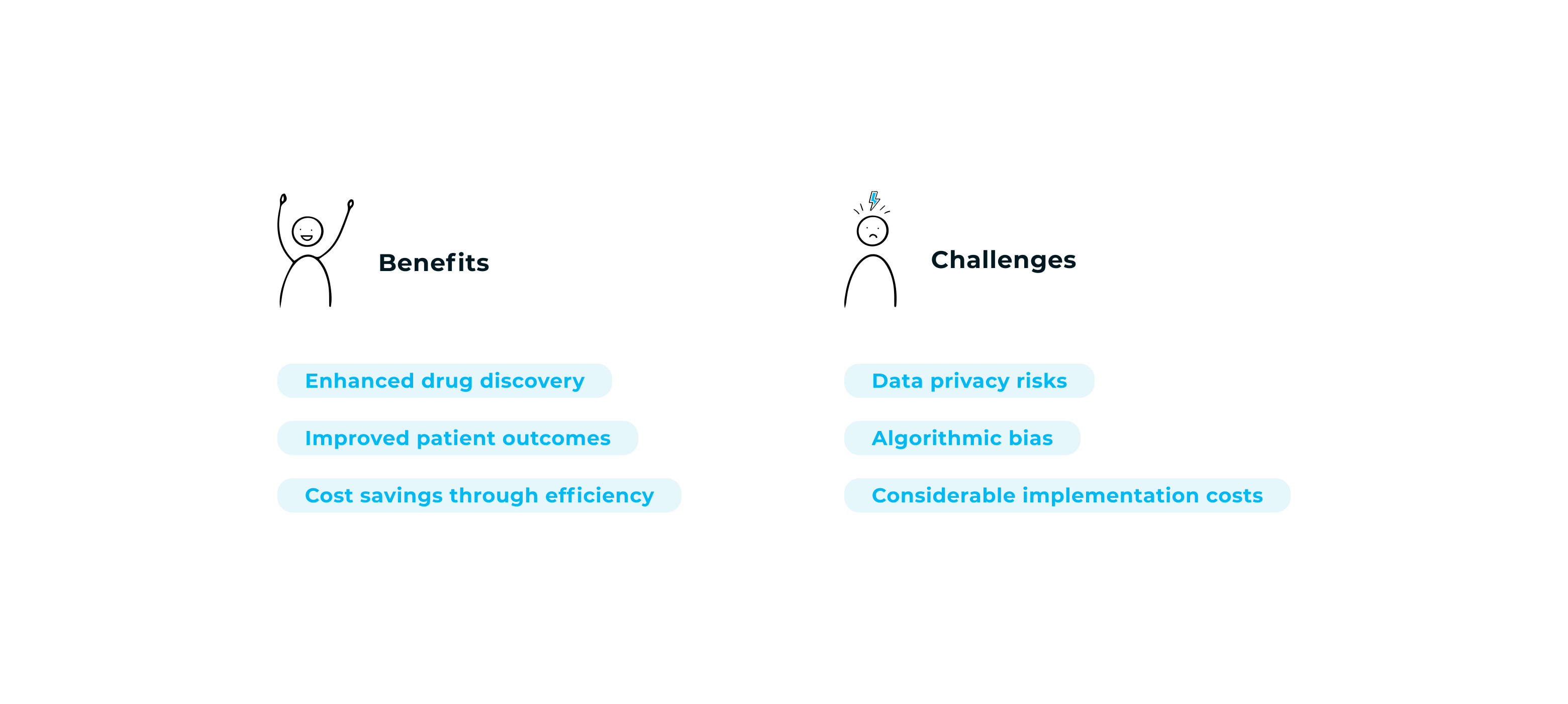The growing role of AI in pharma
Artificial intelligence (AI) is currently shaking up businesses, industries and entire countries. Some examples? Tech companies are investing billions to make sure they can lay the foundation for sustained business success in the near future. Other companies are implementing AI solutions, hoping to accelerate and automate processes.
Let’s have a look into how that transformation is happening for AI in pharmaceutical industry:
AI accelerates drug discovery and development
One of the most promising applications of AI in pharma is in drug discovery. Traditionally, exploring the use of new drugs is a time-consuming and costly process, taking an average of 10–15 years from initial research to regulatory approval. AI, however, is dramatically accelerating this timeline.
- Identifying potential drug candidates
AI-powered algorithms can analyse complex datasets to identify promising drug compounds much faster than traditional methods. Machine learning models can predict the effectiveness of new drugs by examining molecular structures and their interactions.
- Reducing research costs
AI-driven simulations can reduce the need for expensive lab experiments, helping pharma companies cut R&D costs while improving accuracy in drug development.
- Repurposing existing drugs
AI is also being used to identify new uses for existing drugs, helping speed up approvals and reduce development timelines.
Companies like Insilico Medicine are leading the charge, using AI to reduce R&D costs and development timelines (Insilico Medicine).

AI in clinical trials: faster, smarter, more efficient
Clinical trials are a cornerstone of pharmaceutical innovation. Yet, they are often expensive and time-consuming.
- Optimising patient recruitment
AI can analyse electronic health records (EHRs) to identify suitable candidates for clinical trials, improving recruitment speed and diversity.
- Improving trial design
AI models help design more effective clinical trials by predicting potential outcomes and identifying optimal dosing strategies.
- Real-time monitoring
AI-driven analytics provide real-time insights during trials, enabling researchers to adjust fast and fail less.
Pfizer, in collaboration with IBM Watson, uses AI to streamline trial design, optimise patient recruitment, and predict trial outcomes (Pfizer). This approach improves efficiency and reduces failure rates.
AI in pharma to optimise operational efficiency & regulatory compliance
The low-hanging fruit for ROI on AI is 100% in optimizing operational efficiency. Low risk, high reward. AI and GenAI are massively streamlining pharma operations by automating documentation, ensuring manufacturing quality, and predicting supply chain issues. This reduces compliance risks, cuts operational costs, and helps companies adapt quickly to regulatory changes while maintaining consistent product quality.
- Reducing cost of internal operations
AI-driven automation dramatically improves efficiency in business-critical processes, particularly where documentation and text play a key role, for example regulatory filings, packaging for distribution and other HQ operations.
- Manufacturing optimisation
AI-driven automation enhances production efficiency, reducing errors and minimising downtime in pharmaceutical manufacturing.
- Supply chain resilience
AI helps pharma companies anticipate disruptions, such as raw material shortages, and develop contingency plans to maintain stability.
For example, Merck has implemented an AI-powered digital assistant, the myGPT Suite, designed to help employees handle daily tasks more efficiently. This tool accelerates productivity by providing immediate, conversational responses powered by AI, reducing operational bottlenecks and delivering better outcomes for customers.

How to start strategically with AI in pharma
The sole availability of AI and Generative AI does not mean use cases just pop up bottom-up, generating immediate impact. What are the true impactful use cases for your situation? How do we make sure solutions are secure, compliant and intuitive for users?
To ensure success with the application of AI in their day-to-day processes, pharma companies should therefore adopt a human-centric AI approach:
1. Co-create a human-centered AI strategy
Start with a one-day workshop, to align on strategy and team. Together, determine the scope and starting point of your AI journey. What are your ambition levels? What are your pain points? What does your tech stack look like? At the end of this session, you will have a roadmap for your AI endeavour.
2. Identify human-centered AI opportunities
Analyse your different current customer journeys and data sources to spot opportunities for human-centric artificial intelligence enhancement. Prioritise strategic use cases based on the envisioned business impact versus the required implementation effort, to guarantee impact over time. This way, you will end up with a prioritised roadmap of human-centered AI opportunities.
3. Prove the value of human-centric AI solutions
Build a quick and valuable ‘proof of concept’ to validate (or not) the targeted opportunities. Test with users, and iterate to further develop the ideas and create an optimised design and experience. You will end up with validated proof of concept of your human-centric AI solutions. This proof of concept will help you with your internal pitch for a budget to make it come to life.
4. Turn solutions into success stories
Now that you have created and validated your proof of concept, and successfully secured an extra budget, it is time to turn these AI opportunities into actual successful AI applications. We work with development partners like SevenLab to launch solutions within your company while navigating internal complexity and building a process for continuous improvement. The result: a market- and enterprise-ready human-centered AI solution.

Be aware of the risks of AI in pharma
While AI in pharma offers immense benefits, it also comes with challenges.
Data privacy and security
AI relies on vast amounts of sensitive data, including patient information, which can be vulnerable to breaches. Therefore, it is important to implement robust data encryption, adhere to GDPR and HIPAA regulations, and ensure you have secure data storage systems in place.
Bias in algorithms
AI systems can inherit biases from training data, potentially leading to inequitable outcomes in clinical trials or patient treatment. To minimise these risks of biases in AI, it is important to use diverse datasets, conduct regular audits, and involve multidisciplinary teams to identify and address any potential bias.
High implementation costs
Implementing AI can be resource-intensive, requiring significant investments in infrastructure, training, and expertise. But it does not have to be. If you start with AI strategically, weighing both the costs and the potential cost savings through the use of AI. Start with smaller, high-impact pilot projects that truly demonstrate ROI before investing more and scaling up AI initiatives.
AI in pharmaceutical industry? Here to stay.
Artificial intelligence in pharma is one of the biggest game changers of the industry: faster innovation, improved patient outcomes, improved efficiency. Pharma companies looking to get started can best unlock its potential by addressing risks and adopting AI strategically. Find those use cases, build a proof of concept, turn them into solutions, and turn solutions into success. And we’re here to help.

Ready to start your Human-centered AI journey?
Contact us today to explore how AI can transform your pharmaceutical business.


